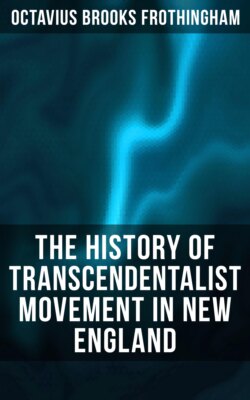Читать книгу The History of Transcendentalist Movement in New England - Octavius Brooks Frothingham - Страница 14
На сайте Литреса книга снята с продажи.
TRANSCENDENTALISM IN ENGLAND.
ОглавлениеTable of Contents
The prophet of the new philosophy in England was Samuel Taylor Coleridge; in the early part of the present century, perhaps the most conspicuous figure in our literary world; the object of more admiration, the centre of more sympathy, the source of more intellectual life than any individual of his time; the criticism, the censure, the manifold animadversion he was made the mark for, better attest his power than the ovations he received from his worshippers. The believers in his genius lacked words to express their sense of his greatness. He was the "eternal youth," the "divine child." The brilliant men of his period acknowledged his surpassing brilliancy; the deep men confessed his depth; the spiritual men went to him for inspiration. His mind, affluent and profuse, contained within no barriers of conventional form, poured an abounding flood of thoughts over the whole literary domain. He was essayist, journalist, politician, poet, dramatist, metaphysician, philosopher, theologian, divine, critic, expositor, dreamer, soliloquizer; in all eloquent, in all intense. The effect he produced on the minds of his contemporaries will scarcely be believed now. At present he is little more than a name: his books are pronounced unreadable; his opinions are not quoted as authority; his force is spent. But in 1851, Thomas Carlyle, then past the years of his enthusiasm, and verging on the scornful epoch of his intellectual career, spoke of him, in the "Life of Sterling," as "A sublime man, who, alone in those dark days, had saved his crown of spiritual manhood; escaping from the black materialisms and revolutionary deluges, with God, freedom, immortality still his; a king of men. The practical intellects of the world did not much heed him, or carelessly reckoned him a metaphysical dreamer; but to the rising spirits of the young generation he had this dusky, sublime character, and sat there as a kind of Magus, girt in mystery and enigma, his Dodona oak grove (Mr. Gillman's house at Highgate) whispering strange things, uncertain whether oracles or jargon." "To the man himself, Nature had given in high measure the seeds of a noble endowment, and to unfold it was forbidden him. A subtle, lynx-eyed intellect, tremulous, pious sensibility to all good and all beautiful; truly a ray of empyrean light—but imbedded in such weak laxity of character, in such indolences and esuriences, as made strange work with it. Once more, the tragic story of a high endowment with an insufficient will."
The abatement is painfully just; but while Coleridge lived, this very indolence and moral imbecility added to the interest he excited, and gave a mystic splendor as of a divine inspiration to his mental performances. The distinction between unhealthiness and inspiration has never been clearly marked, and the voluble utterances of the feebly outlined and loosely jointed soul easily passed for oracles. Thus his moral deficiencies aided his influence. His wonderful powers of conversation or rather of effusion in the midst of admiring friends helped the illusion and the fascination. He really seemed inspired while he talked; and as his talk ranged through every domain, the listeners carried away and communicated the impression of a superhuman wisdom.
The impression that Coleridge made on minds of a very different order from Carlyle's, is given in the following lines by Aubrey de Vere:
